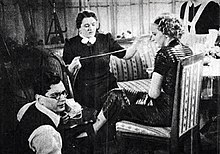Loading AI tools
Hungarian-Spanish film director From Wikipedia, the free encyclopedia
Ladislao Vajda (born Weisz László; 18 August 1906, Budapest – 25 March 1965, Barcelona) was a Hungarian-Spanish[1] film director who made films in Hungary, Spain, Portugal, the United Kingdom, Italy and West Germany.
Ladislao Vajda | |
|---|---|
 Shooting photo from Az én lányom nem olyan. On the left the director László/Ladislao Vajda, in the middle Ella Gombaszögi, on the right Klári Tolnay. | |
| Born | Weisz/Vajda László 18 August 1906 Budapest, Hungary |
| Died | 25 March 1965 (aged 58) Barcelona, Spain |
| Resting place | Sacramental de San Justo, Madrid, Spain |
| Occupation | Film director |
| Years active | 1932–1965 |
Vajda was born in Budapest, his father being an actor and screenwriter.[2]
Vajda started his career as film editor (even though he also worked as artistic designer and writer) for different directors, such as Billy Wilder and Henry Koster. Eventually, he undertook his first directorial effort in his native country, Hungary.
Before World War II he became established in Italy, where he directed two movies: La zia smemorata (1940) and Giuliano de' Medici (1941). Finally, he moved to Spain, where he continued directing films. The first film from his Spanish period was Se vende un palacio (A Palace for Sale), released in 1943. During the 1940s, Vajda directed several movies in Portugal, United Kingdom and, mainly, in Spain.
However, he would reach his artistic peak in the 1950s. Vajda's movies during this period are clearly influenced by the German director Fritz Lang. His main works during this period are: Miracle of Marcelino (1955),[3] Uncle Hyacynth (1956), Afternoon of the Bulls (1956), The Man Who Wagged His Tail (1957) with Peter Ustinov, and It Happened in Broad Daylight (1958). They were acclaimed by both critics and public: The Miracle of Marcelino and Uncle Hyacynth won different prizes in Cannes Film Festival and Berlin Film Festival; Afternoon of the Bulls was nominated for the Palme d'Or[4] and It Happened in Broad Daylight for the Golden Bear.
During the 1960s, Vajda worked on several different minor works in West Germany and Spain. He died in Barcelona in 1965.
Seamless Wikipedia browsing. On steroids.
Every time you click a link to Wikipedia, Wiktionary or Wikiquote in your browser's search results, it will show the modern Wikiwand interface.
Wikiwand extension is a five stars, simple, with minimum permission required to keep your browsing private, safe and transparent.